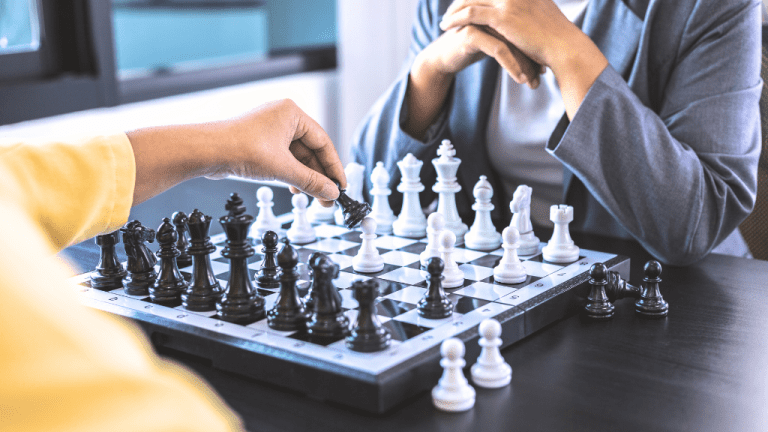Balancing academics with a passion like chess is a challenge that many kids and parents face. Chess improves cognitive abilities, teaches critical thinking, and fosters discipline—skills that directly benefit school performance. However, finding the right balance ensures that neither academics nor chess practice is compromised. This guide offers actionable tips to help young chess enthusiasts excel both on the board and in the classroom.
1. Set Clear Goals for Chess
- Hobby or competitive play? Determine your child’s chess goals. If they enjoy chess recreationally, practicing 30–60 minutes a day might be enough. For competitive players aiming to improve rankings or prepare for tournaments, 1-2 hours on school days and extended sessions on weekends may be necessary.
- Consider developmental stages: Younger children may require less structured practice, while older students balancing exams and competitive chess might need more strategic planning.
Parent’s Tip: “We started with just 20 minutes a day for my daughter. Once she became interested in competitions, we gradually increased her practice time. Keeping her involved in setting the schedule was key.” Sunita, Parent of a 10-year-old chess player
2. Make Academics the Priority, But Use Chess as a Complement
- Chess Boosts Academic Skills: Studies show that chess improves focus, memory, and mathematical skills. Position chess as a brain-training activity that complements schoolwork rather than competes with it.
- Tip: Use chess as a mental break after study sessions to refresh and re-engage.
Example: Aryan, a middle school chess enthusiast, uses chess puzzles as a reward after finishing his math homework. His parents noticed a marked improvement in his problem-solving abilities since he started playing regularly.

3. Plan Ahead During Tournament Season
- Competitive chess often demands intensive practice, especially before tournaments. Prepare for these periods by:
- Informing teachers early and requesting homework extensions if necessary.
- Prioritising key assignments or tests ahead of time.
Coach’s Advice: “During tournament prep, focus on quality over quantity in both schoolwork and chess. Short bursts of intense focus on specific areas work better than hours of general practice.” Coach Arjun, Chess Trainer
4. Time-Management Techniques for Kids
- Help kids use tools like planners or apps to balance school, chess, and other activities.
- Encourage methods like the Pomodoro Technique, which alternates focused study sessions with short breaks. Chess practice can fit perfectly into these breaks, keeping the mind active yet relaxed.
Real-Life Example: Divya, a high school student and chess prodigy, uses a weekly planner to map out her commitments. She allocates two hours on weekends for tournament preparation and keeps weekdays lighter to focus on academics.
5. Leverage Online Resources to Save Time
- Platforms like Chess.com and Lichess.org provide tools for rapid games, puzzles, and tutorials, allowing kids to practice efficiently at home. These online resources save travel time and provide structured learning paths.
Quote: “Online platforms helped me analyze my games faster. I can play a quick 15-minute match without it taking up too much time during school days.” Rohan, 12-year-old chess player
6. Support Mental and Physical Well-being
- Overscheduling can lead to burnout. Ensure kids have time for relaxation, physical activities, and sleep.
- Physical activity enhances focus and energy levels, benefiting both chess performance and academics.
Tip: Encourage outdoor activities like cycling or yoga. Balancing mental and physical exercises keeps kids energised and prevents monotony.
7. Parental Support and Collaboration
- Monitor Workload: Stay involved to ensure kids don’t feel overwhelmed.
- Collaborate with coaches and teachers: Communicate with chess coaches to set realistic practice schedules and work with teachers to manage academic expectations.
- Celebrate Progress: Recognise and reward milestones in both chess and academics to keep motivation high.
Example: Ravi, a parent, says, “We celebrate small wins—whether it’s a good grade in school or winning a chess match. It helps my son see that both are equally important.”
Real-Life Inspiration: Learning from Chess Prodigies
Chess legends like Magnus Carlsen managed to balance school and chess during their formative years. Magnus reportedly dedicated time daily to chess while maintaining a focus on schoolwork. Similarly, Indian Grandmaster Praggnanandhaa’s family emphasised a structured routine to balance his chess career and education, showing that discipline and flexibility are key.
Conclusion
Chess academics don’t have to compete—they can complement each other beautifully when balanced thoughtfully. By setting clear goals, fostering time-management skills, and prioritising well-being, kids can excel in both their educational and chess journeys. Every child’s needs are unique, so adapt schedules to match their aspirations. With the right approach, kids can become not only better chess players but also well-rounded individuals ready to take on life’s challenges.


Recent Comments